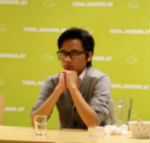SUMMARY
This is AI generated summarization, which may have errors. For context, always refer to the full article.
 Who owns the world? In a philosophical sense, humanity has always shared a common ownership of the planet. In the early years of our existence, we went out of our caves, looked beyond the horizon and realized the vast frontier that was everywhere and that was ours to conquer. And we did. We humans took over this blue planet, mastered it and took advantage of it for our collective benefit.
Who owns the world? In a philosophical sense, humanity has always shared a common ownership of the planet. In the early years of our existence, we went out of our caves, looked beyond the horizon and realized the vast frontier that was everywhere and that was ours to conquer. And we did. We humans took over this blue planet, mastered it and took advantage of it for our collective benefit.
How far have we gone? Far enough to build borders around ourselves and in ourselves. After colonizing corners and building civilizations, we gave birth to nation-states that bolstered the idea of nationalism; the very idea that caused endless injustices and armed conflicts around the globe. The notion that a particular nation is the best in the world just because one is born in it has led to hatred toward other cultures.

But that was also the same idea that united peoples against oppressive imperial regimes to regain freedom and independence. But is it still relevant in this century to identify ourselves geographically by our nation? I would say no.
We Filipinos have a history of proudly embracing our roots. Our culture dictates that we have the duty to be makabansa (patriotic). But in the age of a globalized and interconnected planet, we have to consider and identify ourselves more as earthlings, as human beings, and as citizens of the world.
That is the basic idea of cosmopolitanism. The cosmopolite advocates an ideal community among all human beings regardless of ethnic, socio-cultural and political affiliations.
The cosmopolitan manifesto is not to instantly promote an illuminati-style world government, but rather to promote a philosophical way of life, a reflective overview that revolutionizes our perspective of our place in world, if not the universe.
Being a cosmopolite is not to reject the notion of ethnic and cultural differences, but to embrace multiculturalism. It is to become a humanist, to care for fellow human beings and to respect their human rights and dignities. It is to understand our shared responsibility in attaining a sustainable world, where we help build an expedient future society marked by solidarity and interdependence.
Being a cosmopolite is to also become an internationalist, one who advocates for greater political and economic cooperation among all nation-states for the benefit of the world and the world citizenry. By 2015, ASEAN states will take the next ambitious step in integration, the similar integration that occurred in Europe during the late 20th century that made the continent stronger and more resilient.
Filipinos should be looking forward to our upcoming integration with our neighbors. We should acknowledge the notion that when nations cooperate, long-term mutual interests are satisfied that produce greater value than individual short-term needs. It ensures inevitable regional security, stability and prosperity.
Such forms of integration are currently in progression around the globe. And that is the first step in attaining a truly cosmopolitan world. It is certain that other regional organizations in the international community would follow suit and would eventually collaborate together and change the scope of global governance.
Mankind is on the verge of an existential crisis if nations do not work together and combat the common global security issues our world faces today: climate change, terrorism, poverty, and wars. The world belongs to us, and we must promote ideas that will help shape the next generations to come. Will we eventually overcome our nationalistic ideals and live in a truly globalized civilization, a world without borders and hate? Unfortunately, before we genuinely reach the time where geographical borders are abolished, our moral borders inside ourselves would have to be dealt with first.
I am a visionary, albeit a rational one. I believe that the global order is socially constructed and can be changed by taking action. It is an idealistic idea, while still relatively realistic. We are capable of greatness if we put our minds to it, for the world is what we make of it. So let’s start thinking beyond our borders. – Rappler.com
Joshua Makalintal is a university-preparatory student based in Innsbruck, Austria. He is a political blogger and a member of the European Youth Press. His is also engaged in political activism with the Young Greens of Austria, advocating for a more progressive and sustainable world. Follow him on Twitter:@joshmaks
Add a comment
How does this make you feel?
There are no comments yet. Add your comment to start the conversation.